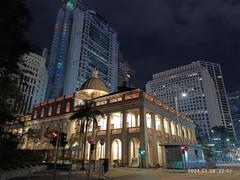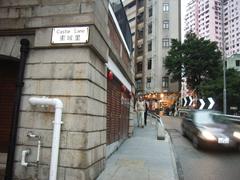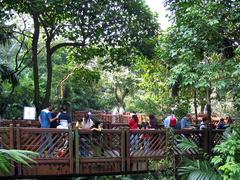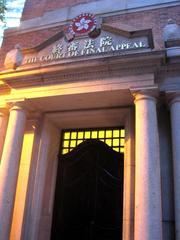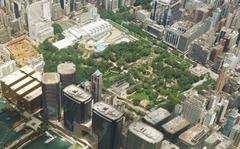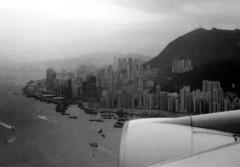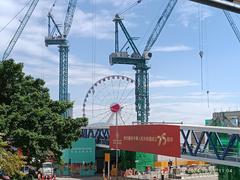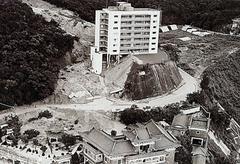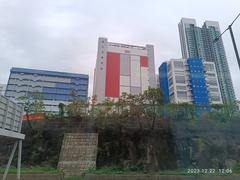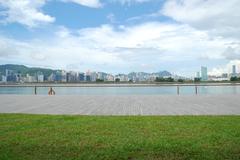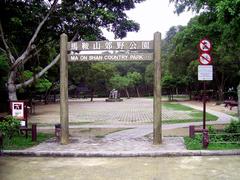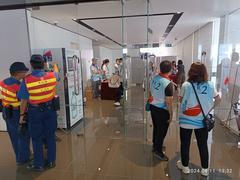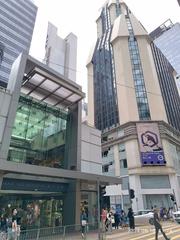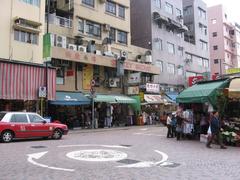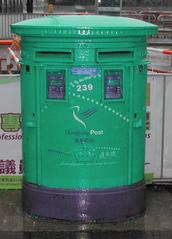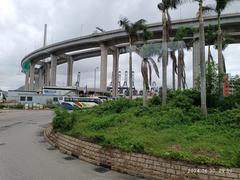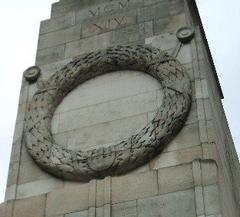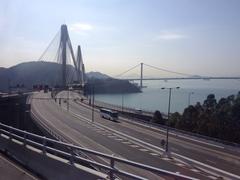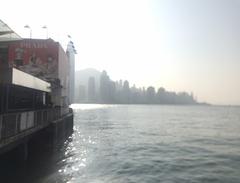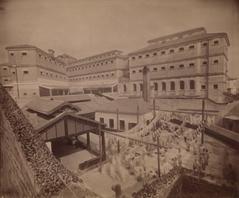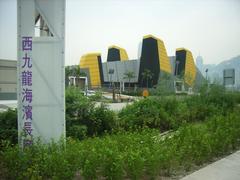
Comprehensive Guide to Visiting Hong Kong, People’s Republic of China
Date: 14/08/2024
Captivating Introduction
Welcome to Hong Kong, a city where the past and the future coexist in a mesmerizing dance of culture, commerce, and innovation. Imagine stepping into a world where ancient temples share the skyline with futuristic skyscrapers, where the aroma of sizzling street food mingles with the scent of incense from centuries-old shrines. This is Hong Kong, a vibrant metropolis that captivates the senses and ignites the imagination.
Hong Kong’s history is a tapestry woven with threads of ancient traditions and colonial influences. Once a modest fishing village, its strategic location on the South China Sea transformed it into a bustling hub of trade and commerce. The mid-19th century marked a turning point when Hong Kong became a British colony following the Opium Wars, setting the stage for its evolution into a global financial center (National Geographic). Fast forward to 1997, and Hong Kong’s handover to China under the ‘one country, two systems’ principle promised a unique blend of autonomy and integration (History.com).
But Hong Kong is more than its history. It’s a city that never sleeps, where neon lights flicker above bustling markets and the melodious hum of Cantonese fills the air. From its iconic skyline and world-class dining to its hidden gems and vibrant festivals, Hong Kong offers an endless array of experiences. Whether you’re riding the historic Peak Tram, savoring dim sum at a local teahouse, or exploring the tranquil Nan Lian Garden, Hong Kong’s dynamic energy and cultural richness will leave you spellbound.
So buckle up! This comprehensive guide will take you on an unforgettable journey through Hong Kong’s storied past, its significant present, and its promising future. With the Audiala tour guide app, you’ll unlock the city’s secrets and stories, making your adventure even more immersive and memorable.
Table of Contents
- Historical Background
- Significance of Hong Kong
Historical Background
Early History and Colonial Era
Imagine a city where ancient temples stand amidst towering skyscrapers, where the scent of incense mingles with the aroma of street food, and where the past and present dance together in a captivating symphony. Welcome to Hong Kong! Its history dates back to the Old Stone Age, with archaeological evidence indicating human habitation in the region for thousands of years. Initially a modest fishing and farming village, Hong Kong’s strategic location on the South China Sea made it an attractive site for trade and commerce.
The turning point in Hong Kong’s history came in the mid-19th century. After the First Opium War (1839-1842), the Qing dynasty ceded Hong Kong Island to the British Empire under the Treaty of Nanjing in 1842. This marked the beginning of Hong Kong as a British crown colony. The colony expanded in 1860 when Britain acquired the Kowloon Peninsula after the Second Opium War. Further expansion occurred in 1898 when Britain obtained a 99-year lease of the New Territories, which included the mainland area north of Kowloon and over 200 outlying islands.
Japanese Occupation and Post-War Era
During World War II, Hong Kong was occupied by Japan from 1941 to 1945, a period of hardship and suffering for the local population. After Japan’s defeat, Hong Kong was liberated by joint British and Chinese forces and returned to British rule.
The post-war period saw significant changes in Hong Kong. The territory experienced a population boom as refugees fled from mainland China, particularly during the Korean War and the Great Leap Forward. This influx of people transformed Hong Kong from a trading outpost into a bustling industrial and manufacturing hub.
Economic Transformation
The 1950s and 1960s were pivotal decades for Hong Kong’s economic development. The territory transitioned from a manufacturing-based economy to a service-oriented one, focusing on finance, shipping, and trade. By the early 1990s, Hong Kong had established itself as a global financial center and a major international port.
The Sino-British Joint Declaration and Handover
In 1984, British Prime Minister Margaret Thatcher and Chinese Premier Zhao Ziyang signed the Sino-British Joint Declaration. This agreement outlined the terms under which Hong Kong would be handed over to China in 1997. The declaration stipulated that Hong Kong would become a Special Administrative Region (SAR) of China, maintaining a high degree of autonomy under the principle of “one country, two systems” for 50 years.
On July 1, 1997, Hong Kong was officially handed over to China, ending 156 years of British colonial rule. The handover ceremony was a significant event, attended by dignitaries from around the world. Hong Kong adopted the Basic Law, its mini-constitution, which guarantees certain freedoms and rights not available in mainland China.
Post-Handover Developments
The years following the handover have been marked by both economic success and political challenges. Hong Kong continued to thrive as a financial hub, with strong economic ties to mainland China. In 2022, the annual bilateral trade between Hong Kong and China was valued at over $593.5 billion.
However, the political landscape has been turbulent. The proposed implementation of Article 23 of the Basic Law in 2003, which aimed to enact national security legislation, led to massive protests and the eventual shelving of the bill. The 2014 Umbrella Movement saw pro-democracy activists occupy major areas of the city, demanding electoral reforms. More recently, the 2019 protests against the proposed extradition bill highlighted the growing tensions between Hong Kong’s desire for greater autonomy and Beijing’s increasing influence.
National Security Law and Current Status
In 2020, the National People’s Congress passed the Hong Kong national security law, which aimed to restore stability but was criticized for undermining the “one country, two systems” principle. The law has led to further political pessimism and concerns about the erosion of freedoms in Hong Kong.
Despite these challenges, Hong Kong remains a vibrant and dynamic city. Its unique blend of Eastern and Western cultures, coupled with its status as a global financial center, continues to attract tourists and business professionals from around the world. The city’s efficient public transport system, diverse culinary scene, and numerous attractions make it a must-visit destination.
Key Historical Sites
For visitors interested in Hong Kong’s rich history, several sites offer a glimpse into its past:
- Victoria Peak: Offering panoramic views of the city, Victoria Peak has been a popular spot since colonial times.
- Man Mo Temple: One of the oldest temples in Hong Kong, dedicated to the gods of literature and war.
- Hong Kong Museum of History: Provides an in-depth look at the city’s history from prehistoric times to the present.
Significance of Hong Kong
Historical Significance
Colonial Era and Opium Wars
Hong Kong’s history reads like a gripping novel of intrigue and power. Once a sleepy fishing village, it transformed into a British colonial stronghold in the 19th century. The First Opium War (1839-1842) saw China clashing with Britain over the opium trade, culminating in the Treaty of Nanjing, which handed Hong Kong Island to Britain (National Geographic).
The plot thickened with the Second Opium War (1856-1860), expanding British control to the Kowloon Peninsula and Stonecutters Island under the Convention of Peking in 1860 (History.com). By 1898, the British Empire secured a 99-year lease on the New Territories, vastly increasing Hong Kong’s size (National Geographic).
World War II and Japanese Occupation
World War II brought dark days as Japanese forces occupied Hong Kong from 1941 to 1945. After the war, the resilient city bounced back under British rule, embarking on a rapid modernization journey (History.com).
Post-War Economic Boom
The post-war era saw an influx of immigrants from mainland China, fueling Hong Kong’s rise as a global trade hub. Dubbed one of the “Four Asian Tigers,” the city experienced unprecedented industrialization and economic growth (National Geographic).
Political Significance
Handover to China
The clock struck midnight on July 1, 1997, and Hong Kong was handed back to China under the “one country, two systems” principle, preserving its capitalist way of life for 50 years (History.com). This unique arrangement aimed to grant Hong Kong a high degree of autonomy.
Recent Political Unrest
In recent years, Hong Kong has been a hotbed of political activity. The 2014 Umbrella Movement and the 2019 extradition bill protests showcased the city’s fierce fight for autonomy against Beijing’s growing influence (National Geographic).
Economic Significance
Financial Hub
A titan in the global financial arena, Hong Kong is famed for its free-market economy, low taxes, and solid legal framework. The Hong Kong Stock Exchange ranks among the world’s largest, serving as a crucial gateway between international businesses and China (Lonely Planet).
Trade and Commerce
Strategically perched on the Pearl River Delta, Hong Kong’s deep-water port is a linchpin in global trade, bustling with maritime cargo (The Broke Backpacker).
Cultural Significance
East Meets West
In Hong Kong, East truly meets West. Marvel at colonial-era buildings juxtaposed with sleek skyscrapers, or indulge in a culinary journey from traditional dim sum to gourmet international dishes (Cultural Places).
Festivals and Traditions
Hong Kong’s calendar is dotted with vibrant festivals. Whether it’s the colorful Chinese New Year Parade, the exhilarating Dragon Boat Festival, or the enchanting Mid-Autumn Festival, each event offers a peek into the city’s rich cultural tapestry (Discover Hong Kong).
Visitor Tips
Best Time to Visit
Plan your trip between October and December for pleasant weather and manageable crowds. Steer clear of the hot, humid summer months prone to typhoons (We Will Nomad).
Getting Around
Navigating Hong Kong is a breeze with its extensive public transport system, including buses, trams, ferries, and the MTR. Grab an Octopus card for seamless travel and use it at various retail outlets too (Discover Walks).
Accommodation
Stay in bustling districts like Tsim Sha Tsui, Causeway Bay, or Central. These areas offer a range of accommodations and are well-connected to major attractions (The Broke Backpacker).
Language and Communication
While Cantonese is the main language, English is widely spoken, especially in business and tourist hotspots. Learning a few Cantonese phrases can be fun and endearing to locals (Discover Walks).
Must-See Attractions
Victoria Peak
Take the Peak Tram for a scenic ride to Victoria Peak, where you’ll be greeted with breathtaking views of Hong Kong’s skyline and Victoria Harbour (The Broke Backpacker).
Tsim Sha Tsui Promenade
Stroll along the Tsim Sha Tsui Promenade for stunning views of the Hong Kong skyline. Don’t miss the Avenue of Stars, celebrating the city’s film industry legends (The HK Hub).
Big Buddha and Po Lin Monastery
Visit the majestic Big Buddha on Lantau Island, one of the largest seated Buddha statues worldwide, and the serene Po Lin Monastery (The Broke Backpacker).
Wong Tai Sin Temple
Experience local religious traditions at Wong Tai Sin Temple, known for its vibrant atmosphere and fortune-telling practices (The Broke Backpacker).
Culinary Delights
Dim Sum
Indulge in Hong Kong’s famed dim sum at spots like Tim Ho Wan, where Michelin-starred dishes come at wallet-friendly prices (The Culture Trip).
Street Food
Dive into the street food scene with must-try items like egg waffles, fish balls, and stinky tofu. Temple Street Night Market is a hotspot for these local treats (The Culture Trip).
Fine Dining
For a sophisticated dining experience, Hong Kong boasts numerous Michelin-starred restaurants offering diverse cuisines. Check out Lung King Heen and Amber for a culinary adventure (The Culture Trip).
Shopping
Markets
Explore bustling markets like the Ladies’ Market in Mong Kok for fashion finds and the Temple Street Night Market for electronics and antiques (The Broke Backpacker).
Malls
For a modern shopping spree, visit Harbour City in Tsim Sha Tsui, one of the largest malls with a mix of luxury and high-street brands (The HK Hub).
Local Crafts
Don’t miss Cat Street in Sheung Wan for traditional Chinese crafts, antiques, and unique souvenirs (The Broke Backpacker).
Local Secrets and Hidden Gems
- Sneaker Street (Fa Yuen Street): A paradise for sneakerheads with rare and trendy kicks.
- Yick Fat Building: An Instagram hotspot with a maze-like residential building offering a glimpse into local life.
- Star Ferry Rides: A classic and scenic way to traverse Victoria Harbour, especially enchanting at night.
- Nan Lian Garden: A tranquil, lesser-known oasis in the city, perfect for a serene escape.
Interactive Challenges
- Dim Sum Safari: Try at least five different dim sum dishes in one day and find your favorite.
- Market Hunt: Find a unique item at each market you visit and create a souvenir scavenger hunt.
- Temple Quest: Visit three temples in a day, learning about different traditions and practices.
Cultural Context and Etiquette
- Gift Giving: Always present gifts with both hands and avoid clocks or sharp objects, which are considered bad luck.
- Dining Etiquette: Don’t stick chopsticks upright in a bowl of rice; it resembles incense sticks used in funerals.
- Queueing: Be patient and orderly; Hong Kongers value queuing in an orderly manner.
Seasonal Highlights
- Spring: Enjoy the blooming flowers and mild weather, perfect for outdoor activities and festivals.
- Summer: Despite the heat, summer is festival season with events like the Hong Kong Dragon Boat Carnival.
- Autumn: The Mid-Autumn Festival lights up the city with lantern displays and mooncakes.
- Winter: Festive decorations and cool weather make it an ideal time for shopping and exploring.
Myth Busting and Surprises
- Myth: Hong Kong is just skyscrapers. Fact: It boasts lush hiking trails, serene beaches, and tranquil islands.
- Myth: Everyone speaks Mandarin. Fact: Cantonese is the primary language, though many are multilingual.
- Myth: It’s all about business. Fact: Hong Kong has a vibrant arts scene with numerous galleries and cultural events.
Call to Action
Ready to uncover the secrets of Hong Kong? Download Audiala, your ultimate tour guide app, and embark on an adventure through this mesmerizing city. With expertly crafted audio guides, Audiala will unveil hidden gems and stories that make Hong Kong unforgettable. Don’t miss out—download Audiala and let the journey begin!
Visitor Tips for Hong Kong
Welcome to the Pearl of the Orient!
Hong Kong—a city that never sleeps, where towering skyscrapers meet ancient temples, and bustling markets coexist with tranquil parks. Ready to dive into this vibrant metropolis? Let’s get started!
Entry Requirements and Visa Information
Before you pack your bags, ensure your travel documents are in order. Hong Kong’s Immigration Department offers a seamless online ‘e-Visa’ application process. Tip: If your visa renewal is delayed, sending an authorized representative to the ImmD office can speed things up. Pro tip: Always double-check your visa’s validity before booking that flight!
Health and Safety Precautions
Hong Kong is serious about your well-being. Here’s your health checklist:
- Medications: Keep alist of your meds and store them in your hand luggage.
- Vaccinations: Consult your doctor or the Travel Health Centers for necessary vaccines like hepatitis A and B, yellow fever, and typhoid fever. Got allergies? Make sure your doctor knows!
COVID-19 Measures
As of March 1, 2024, the mask mandate is history! Enjoy the city mask-free but stay updated on COVID-19 protocols. Note: A HKD 500 (USD 70) fine applies if you test positive. Senior travelers are encouraged to get vaccinated. Safety first, folks!
Getting Around: A Hong Kong Adventure
Hong Kong’s transport system is a marvel. Grab an Octopus card and hop on!
- MTR: The lifeline of Hong Kong, running from 6:00 AM to 1:00 AM. Fast, efficient, and covers all major spots.
- Buses and Trams: Double-decker buses and the iconic “ding-ding” trams offer scenic routes. P.S. The trams are a nostalgic ride along Hong Kong Island’s northern coast.
- Ferries: The Star Ferry is a must—enjoy breathtaking views as you sail between Hong Kong Island and Kowloon.
Stay in Style
Hong Kong boasts over 100,000 hotel rooms, catering to every budget and taste. Where to stay?
- Tsim Sha Tsui: A shopper’s paradise with cultural attractions galore.
- Central: The heartbeat of the city, perfect for luxury and nightlife.
- Causeway Bay: Shop till you drop, then relax in one of the mid-range to high-end hotels.
Hidden Gems and Must-See Attractions
Beyond the famous spots, discover Hong Kong’s hidden treasures:
- Tsim Sha Tsui Waterfront Promenade: Stroll along for stunning harbor views.
- The Peak: For jaw-dropping panoramas, take the historic Peak Tram.
- Hong Kong Disneyland: Magic awaits families and Disney lovers.
- West Kowloon Cultural District: Dive into art at M+, the Hong Kong Palace Museum, and the Xiqu Centre.
- Ngong Ping 360: A cable car ride to Ngong Ping Village, Po Lin Monastery, and the Giant Buddha.
Shop Like a Local
Hong Kong is a shopper’s dream. Explore these hotspots:
- Ladies’ Market: Bargain for unique finds in Mong Kok.
- Temple Street Night Market: A lively market in Yau Ma Tei with goods and street food.
- Causeway Bay: Home to Times Square and SOGO for serious retail therapy.
Taste of Hong Kong
Prepare your taste buds for a culinary adventure:
- Dim Sum: Bite-sized delights in bamboo steamers.
- Roast Goose: Crispy skin, tender meat—a Cantonese classic.
- Egg Tarts: Creamy custard in a flaky pastry shell.
Cultural Etiquette
Blend in with the locals by knowing the do’s and don’ts:
- Language: Cantonese rules, but English is widely spoken in tourist areas.
- Tipping: Not mandatory, but appreciated. Note: A 10% service charge is often included in restaurant bills.
- Respect: Dress modestly and be quiet in temples and cultural sites.
Green Initiatives
Hong Kong is going green! From April 22, 2024, say goodbye to disposable plastic tableware. Hotels are also ditching single-use plastics. Embrace plant-based alternatives and help keep the city eco-friendly.
Emergency Contacts
Keep these numbers handy:
- Police, Fire, and Ambulance: 999
- Tourist Hotline: +852 2508 1234
- Hospital Authority: +852 2300 6555
Uncover Hong Kong’s Hidden Stories with Audiala
Download the Audiala app for expertly crafted audio guides that reveal Hong Kong’s secrets and stories. It’s the perfect companion for curious travelers. Ready to explore? Let Audiala be your guide!
Call to Action
As our journey through Hong Kong draws to a close, it’s clear that this city is a living, breathing mosaic of history, culture, and modernity. From its origins as a humble fishing village to its transformation into a global financial powerhouse, Hong Kong’s resilience and adaptability are nothing short of remarkable. The city’s unique blend of Eastern and Western influences creates a vibrant tapestry that is as dynamic as it is captivating.
Despite the political challenges and uncertainties, Hong Kong remains a beacon of economic vitality and cultural richness. Its world-class infrastructure, thriving arts scene, and culinary delights continue to attract visitors and professionals from around the globe. The city’s commitment to preserving its heritage while embracing innovation ensures that it remains a must-visit destination for anyone seeking a truly multifaceted experience.
Whether you’re exploring the panoramic views from Victoria Peak, delving into history at the Hong Kong Museum of History, or savoring the diverse flavors of its street food, Hong Kong offers something for everyone. And with the Audiala tour guide app by your side, you’ll uncover hidden gems and fascinating stories that make your visit even more enriching.
So why wait? Download Audiala before your trip and let it be your ultimate companion as you navigate the captivating streets of Hong Kong. With expertly crafted audio guides and insider tips, Audiala will help you unlock the city’s secrets and create memories that will last a lifetime. Embark on your Hong Kong adventure today, and experience the magic of this extraordinary city.
References
- National Geographic, n.d., source
- History.com, n.d., source
- Lonely Planet, n.d., source
- The Broke Backpacker, n.d., source
- Cultural Places, n.d., source
- Discover Hong Kong, n.d., source
- We Will Nomad, n.d., source
- Discover Walks, n.d., source
- The HK Hub, n.d., source
- The Culture Trip, n.d., source




